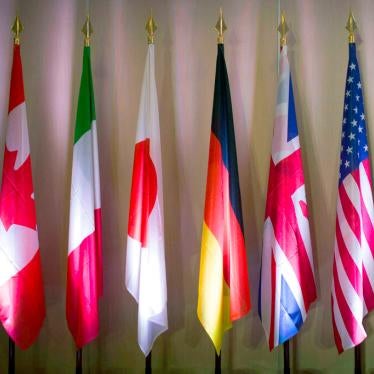We are writing to urge you to use the upcoming country strategy review of Azerbaijan as an opportunity to candidly assess the shortcomings that continue to mar the Azerbaijani government’s human rights record, and to encourage the Azerbaijani authorities to undertake concrete steps to address them in compliance with the Article 1 of the Agreement Establishing the Bank.
We note that the draft “Country Strategy for Azerbaijan 2007-2010” (hereinafter “the draft strategy”) concludes that “economic progress is demonstrable and widely recognised, while progress in transition towards multi-party democracy and pluralism has been slow,” singling out for special attention areas such as media freedoms, elections, corruption, and trafficking in persons.
The draft strategy acknowledges that there are “many challenges remaining” in Azerbaijan’s transition to a more pluralistic society. Human Rights Watch is concerned that the draft strategy’s assessment of some of these challenges is not extensive enough to lead the Bank to pursue needed reform in Azerbaijan. This letter provides further information about key areas in which rampant human rights abuses persist, including the dramatic deterioration of media freedoms, torture, politically-motivated arrests and convictions, violations of freedom of assembly, and pressure on human rights defenders. These types of abuses are especially troubling because they undermine key rights needed for people to be able to hold their government accountable.
In the section entitled “Human Rights Conditions and Media Freedoms,” the draft strategy rightly notes that “a serious obstacle is criminal libel and insult legislature.” However, the Bank should take note of the vigor with which the Azerbaijani government has applied libel, insult, and other laws to silence journalists who criticize its actions. This inhibits, rather than fosters the public scrutiny of government policies that is needed to promote transparency. At least eight journalists are currently behind bars in Azerbaijan, perhaps the highest number in the Europe and Central Asia region. They are:
- Eynulla Fatullayev, founder and the editor-in-chief of Realny Azerbaijan (a Russian-language weekly) and Gundalik Azerbaijan (an Azeri-language daily) newspapers. He was sentenced to 2.5 years in prison on charges on libel and insult in April 2007. On July 4, the Azerbaijani Ministry of National Security filed additional charges against him for terrorism and inciting religious and ethnic hatred for articles printed in Realny Azerbaijan. Both newspapers were effectively shut down on May 22 after Emergency Ministry and National Security Ministry personnel evicted the papers’ staff from their premises, confiscated their computer hard drives, and sealed the office shut;
- Sakit Zahidov, satirist and correspondent of the opposition newspaper, Azadlig. He was sentenced to three years of imprisonment on spurious drug charges on June 23, 2006, apparently in retaliation for newspaper columns and poems he wrote criticizing President Aliyev and his government’s corruption;
- Samir Sadetoglu and Rafik Tagi, editor and correspondent, respectively, for the newspaper Senet. Both were convicted and sentenced to five and three years, respectively, for inciting religious hatred with regard to an article in Senet alleging that Christianity is superior to Islam;
- Faramez Novruzoglu, correspondent for the newspaper, Nota Bene. Novruzoglu has been serving a two-year prison sentence since January 30, 2007 on charges of libel and insult brought by the minister of interior and the chairman of the Committee for Work with the Azeri Diaspora;
- Rovshan Kebirli and Yashar Agazadeh, Muxalifet newspaper editor and correspondent, respectively. On May 16, 2007, both were convicted and sentenced to 2.5 years each on libel and defamation charges brought by a member of parliament with regard to a newspaper article they had written exposing government corruption.
- Mushfig Huseynov, a Bizim Yol newspaper correspondent, was arrested on July 24, 2007 for allegedly taking a US $3,500 bribe from the head of administration of the Ministry of Labour and Social Security. Huseynov had been writing a series of critical articles exposing corruption in the ministry and could have been entrapped as part of a government smear campaign against independent and opposition press.
We are further concerned that the draft strategy gives undue credit to the Azerbaijani government with regard to its Council of Europe commitment to establish a public broadcasting service. In fact, the Azerbaijani government has failed to make good on its commitment to transform AZTV1 into a publicly funded, independent broadcasting service. Instead, authorities changed the state-run AZTV2, a regional channel with a small staff, into a public broadcaster named ITV, which went on air in August 2005, but otherwise continued the pro-government editorial line of the former AZTV2.
The draft strategy further notes that the government liberalized mass media registration procedures, but does not note the obstacles independent and opposition broadcast media face when they apply for renewal of licenses. All nine members of the Azerbaijan’s broadcasting regulator, the National Television and Radio Broadcast Council (NTRBC), are appointed by the president. The independent station, ANS TV faced serious problems in renewing its broadcast license after it expired in 2003, and was even shortly taken off the air in November 2006, when it was again in the process of renewing its license. On a positive note, ANS was given a six-year license in April 2007, however, the content of its programs has been impacted by the licensing ordeal and is prone to self-censorship.
Other media related concerns in Azerbaijan include violence or threats of violence against independent and opposition journalists. The prominent case of Elmar Huseynov, editor-in-chief of newspaper Monitor, who was murdered in March 2005, remains unresolved. Human Rights Watch has documented at least four physical attacks, including one kidnapping, on independent journalists in 2006 and has received complaints of at least three additional attacks in 2007.2 Independent and opposition journalists often receive threatening phone calls, including death threats, after publishing critical articles about the government. The government has not solved a single case of an attack on a journalist.
One well-documented area of concern when it comes to Azerbaijan’s human rights record is the problem of torture, which we note does not currently feature in the draft strategy. NGOs regularly receive reports of torture, particularly in police lockups. Emblematic of this problem is a case Human Rights Watch has been closely monitoring involving three teenage boys convicted in June 2007 of murdering another boy. The boys all stated repeatedly, including at trial, that they were subjected to severe beatings and other forms of torture by police and investigators in March 2005. The main evidence against the boys were the coerced confessions and incriminating statements against one another about participation in the murder, which they all maintained none of them committed. The government failed to conduct a meaningful investigation into these and other allegations of abuse.
The existence of political prisoners is a long-standing problem in Azerbaijan. Although some progress was made in this regard in 2004-2005 and the Council of Europe no longer has a special rapporteur on political prisoners, the problem persists and tends to worsen during election cycles, as the government seeks to incapacitate its most serious rivals. For instance, in advance of the November 2005 parliamentary elections, authorities arrested dozens of high-profile government officials, businessmen, and opposition politicians on allegations of an attempted coup. Most prominent among them are the former Economic Minister Farhad Aliyev and former Health Minister Ali Insanov. Parts of their trials were completely closed and lawyers have cited numerous procedural violations, raising serious concerns about the fairness of the trials. Although President Aliyev issued a decree on March 19, 2007 pardoning 100 people, only one of them was sentenced on political grounds.
Human Rights Watch has received numerous complaints of continuing violations of freedom of assembly by the Azeri government. Several times this year, police have prevented journalists and human rights activists from gathering to protest the government’s pressure on the media and suppression of freedom of expression. For example, on June 14, over 200 Azerbaijani police and security forces forcibly dispersed a demonstration in Baku by a group of 50 journalists and arrested three of them. At least one protester required hospitalization.
Human rights defenders in Azerbaijan have been subjected to physical and verbal attacks and other forms of pressure and harassment, including public smear campaigns on television and in the print media. In the last 11 months, staff of the Institute for Reporter Freedom and Safety (IRFS), an outspoken media monitoring organization, have been subjected to beatings by police, arbitrary detentions, harassment and surveillance by security officials. A campaign to discredit long-time human rights activists Rena and Murad Saddadinov began following their trip to the United States in June 2006, during which they spoke about human rights concerns in Azerbaijan. In a recent incident on July 5, the pro-government “Modern Musavat” party organized a protest outside the NGO Institute for Peace and Democracy, throwing eggs and tomatoes at the walls of the organization and shouting offensive remarks. Police did nothing to apprehend the assailants.
We hope to see the EBRD make full use of the opportunity presented by its upcoming assessment of Azerbaijan to express unambiguous concern about the developments described above. We also hope to see the Bank provide a clear incentive to the Azerbaijani government to undertake concrete and measurable reform steps, first, by articulating what such steps would be, and second, by making clear that their fulfilment will be directly linked to the Bank’s level of investment in the country.
Below is a short list of concrete and measurable reform steps that we encourage the EBRD to advance as part of its dialogue with Azerbaijan.
- Immediately and unconditionally release from prison all journalists convicted of libel and speech related offences; conduct an effective investigation into the circumstances of the arrest of Mushfig Huseynov, as the case bears signs of possible entrapment;
- Enact without further delay a moratorium on criminal libel; decriminalize libel and make it a civil offence. Establish monetary cap on civil lawsuits (for libel);
- Conduct effective investigations into the murder of Elmar Huseynov and all incidents of violence or threats of violence against journalists and hold those responsible accountable;
- Diversify the membership of the NTRBC to ensure broad public confidence. It should include media professionals, civil society members, judicial bodies, government, and political party representatives;
- Refrain from the use of arrest and prosecution to silence political opposition. Ensure fair trial standards. Amnesty prisoners convicted on political charges;
- Investigate all allegations of torture and ill-treatment of detainees and hold perpetrators accountable. Make a statement at the highest level condemning torture and ill-treatment;
- Respect freedom of assembly and thoroughly investigate all cases of use of excessive force by law enforcement during demonstrations;
- Publicly condemn harassment of civil society and thoroughly investigate all physical attacks against human rights defenders.
The above approach would permit the EBRD to give concrete, practical meaning to the principles of Article 1 of the Bank’s founding agreement. It would make clear that in its engagement with the EBRD is guided by a principled approach to human rights and democracy – one that recognizes the interconnectedness of political and economic reforms and uses conditionality the effectively achieve these goals.
We thank you for considering our suggestions and wish you a productive discussion.








